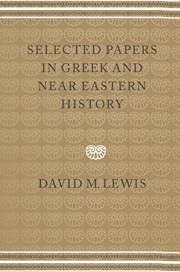Book contents
- Frontmatter
- Contents
- List of plates
- Preface
- Systems of reference
- GENERAL
- ATHENIAN
- NEAR EASTERN
- 31 The Persepolis Fortification Texts
- 32 The King's dinner
- 33 Datis the Mede
- 34 Persians in Herodotus
- 35 The Phoenician fleet in 411
- 36 Persian gold in Greek international relations
- 37 The first Greek Jew
- 38 Review of J. N. Sevenster, Do You Know Greek?
- Bibliography
- Publications of David M. Lewis
- Indexes
38 - Review of J. N. Sevenster, Do You Know Greek?
How Much Greek could the First Jewish Christians have Known?
Published online by Cambridge University Press: 15 January 2010
- Frontmatter
- Contents
- List of plates
- Preface
- Systems of reference
- GENERAL
- ATHENIAN
- NEAR EASTERN
- 31 The Persepolis Fortification Texts
- 32 The King's dinner
- 33 Datis the Mede
- 34 Persians in Herodotus
- 35 The Phoenician fleet in 411
- 36 Persian gold in Greek international relations
- 37 The first Greek Jew
- 38 Review of J. N. Sevenster, Do You Know Greek?
- Bibliography
- Publications of David M. Lewis
- Indexes
Summary
The scope of this careful, sensible, and up–to–date book is adequately indicated by its sub–title. It deserves wide circulation and consideration. It has been admirably translated by Mrs J. de Bruin, who deserves a special word of praise.
An introduction (pp. 1–21) sketches the reasons why the problem is important and concentrates inevitably on the Epistle of James and the prominence of the linguistic argument in discussions of it. The author detects a regrettable subjectivity in approaches to James and enunciates clearly the need for objective criteria.
The work proper begins with a three–part chapter on Literary Sources, covering the New Testament (pp. 23–38), the Rabbinical Writings (pp. 38–61), and Josephus (pp. 61–76). We are thus confronted immediately with what seems to me the book's most obvious and regrettable omission, a section on the inter–testamental period. To put my requirements at a minimum, we needed a discussion of the Septuagint Esther which declares itself clearly to have been translated in Jerusalem. Most of us would go a stage further and assert that at least B and E of the additional material were written rather than translated there. Whether the Septuagint Esther is a product native to Jerusalem or whether Lysimachos son of Ptolemy was a settler from Alexandria does not seem to me to make much difference in considering the availability of reasonably good Greek in Hasmonean Jerusalem. Clearly the way in which the Hasmoneans communicated with foreign states and the Diaspora also needs consideration. The investigation will start from II Mace. I, but will not end there.
- Type
- Chapter
- Information
- Selected Papers in Greek and Near Eastern History , pp. 383 - 388Publisher: Cambridge University PressPrint publication year: 1997



